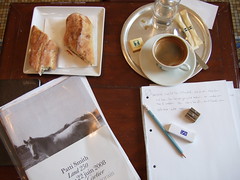[As ever, this is available on the BBC News website]
On Monday 31st March I was at Queens’ College, Cambridge, for the dinner to celebrate the 70th anniversary of the formation of the Mathematical Laboratory, which later became the Computer Laboratory. Maurice Wilkes, who build the EDSAC in 1949, was there, and gave a speech. And the conversation on my table was largely about the problems of finding good programmers and of persuading young people that Computer Science is a good degree to do. This article was the result.
Maurice Wilkes, who build the EDSAC in 1949, was there, and gave a speech. And the conversation on my table was largely about the problems of finding good programmers and of persuading young people that Computer Science is a good degree to do. This article was the result.
Sixty years ago, on June 21 1948, the Small-Scale Experimental Machine, or ‘Baby’, ran its first program and the age of the stored program digital computer properly began.
Built by a team led by Tom Kilburn and Freddie Williams at Manchester University, Baby showed that storing the instructions for a computer in the same memory as the data it was working on was both feasible and effective.
Continue reading “Who Will Write Tomorrow’s Code?”





